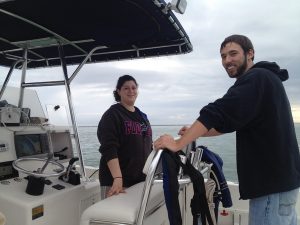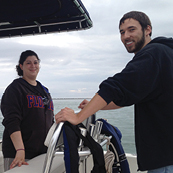
Researchers from Nova Southeastern University’s Oceanographic Center (OC) recently participated in a three-week field campaign in the Gulf of Mexico that centered on the fate of oil that is released into the environment. As a part of this study, NSU researchers also took sea surface and subsurface samples to aid in a NSU project that is currently funded by a President’s Faculty Research and Development grant. Alexander Soloviev, Ph.D., a professor at NSU’s OC, traveled to the Pensacola-Destin area as part of the Consortium for Advanced Research on Transport of Hydrocarbon in the Environment (CARTHE) research team. Accompanying Soloviev on the research trip were Bryan Hamilton and Cayla Dean, two OC graduate students.

CARTHE’s purpose is research that will help predict the fate of oil that is released into the environment and help inform and guide response teams. These predictions can help minimize oil spill damage to human health, the economy, and the environment. As a part of this study, Soloviev, Hamilton and Dean implemented new methods to sample the sea surface microlayer and subsurface water in order to determine what types of surfactant and oil associated bacteria were present. These bacteria can aid in the formation of sea slicks, which affect many aspects of the sea surface and can be seen in satellite imagery. Certain bacteria can also use oil as a source of energy, making these organisms important when studying the presence of oil in marine environments.

